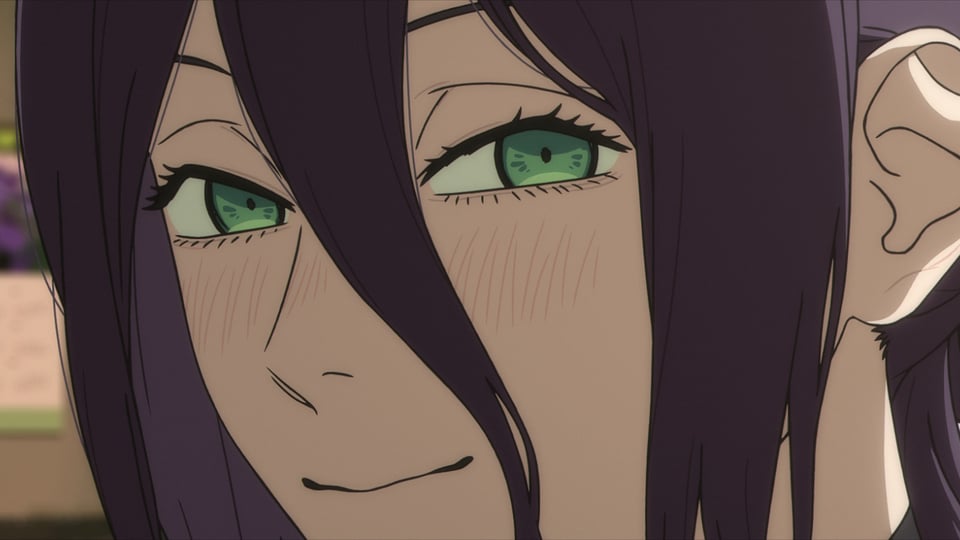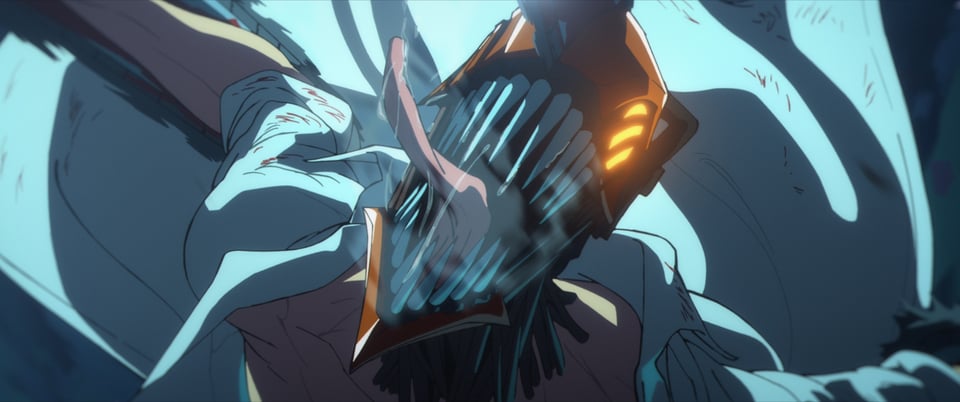Love is a dog from hell
We review Chainsaw Man: The Movie – Reze Arc, a dazzling feature which is at its most spectacular at its quietest.
by Kambole Campbell

The biggest moments of Chainsaw Man: The Movie – Reze Arc – a film where a 16 year old boy who can turn his head and limbs into power tools and rides a shark with legs through a giant hurricane monster – are the ones about heartbreak. For those not familiar with Chainsaw Man, it's based on a manga by Tatsuki Fujimoto. In a setting where humanity is plagued by 'Devils' borne from concepts and fears like Famine, Darkness, Falling, Zombies, Guns, or even Muscles, Denji, an orphaned teenager, lives in extreme poverty with no one but a small Chainsaw devil (which looks like a dog) for company. Denji works as a devil hunter for the Yakuza to pay off his late father's massive debts. In a moment that illustrates the encroaching grimness of the rest of the comic, the Yakuza leave him for dead. The canine-like Chainsaw Devil, Pochita, saves his life in one of the few acts of genuine charity in the entire series, replacing Denji's heart in exchange for Denji "following his dreams."
This deal gives him the power to turn into Chainsaw Man, a human with the powers of a devil, not unlike Go Nagai's Devilman. This comes back to bite him, as Makima, a government agent, immediately coerces him into service under threat of death just after he exacts revenge on his treacherous ex-employers. Denji agrees, and seems mostly content with the small basic luxuries this new life affords him, all the while slowly falling in love with Makima, a woman who is essentially his captor. Along comes Reze, a girl who works in a local coffee shop, who Denji meets in the rain the day after Makima takes him on a date to a movie marathon. She immediately questions the ways in which Denji has devalued his own life, taught to be content with so little, and uneducated to the point that he doesn't really know any better. It's a key part of the appeal of the comic's main through-line (in part 1 of the series, anyway) – it's essentially a story about learning how to be a person in a world that teaches you become a commodity.
And so of course, romance is also commodified by Makima and others – Denji starts the series with the puerile desire to "score" or touch boobs, only to quickly realize that these things, while nice, mean more through a personal connection. Too bad, then, that this particular person (Makima) wants to control him – and Reze seems to want Denji to liberate himself from this false contentment, stuck in arrested development by a lack of education and years of poverty as well as a lack of genuine love or empathy. (She didn't even have to try that hard – his decimated self-esteem evident in the throwaway line "I like people who like me too").
Perhaps he's already on his way there, on some level. The Reze film's manga styled opening sees the motif of the closed door, a symbol of Denji's troubled mind ignoring the repressed trauma of his past and the Faustian elements of the bargain he's struck with Makima. Later, he puts it together that everyone in one way or another pursues his "Chainsaw heart", but not his own heart, his own intrinsic worth apart from being the living host of the Chainsaw Devil. The real magic of the film is in how these smaller and more personal moments loom over everything else, no matter how big and loud the film gets (and, having seen this at the BFI IMAX in London, boy this was loud).

There's a nagging part of me that felt a little wary of the film's aesthetics – the brighter colours, warmer lighting and looser linework – drifting into what felt like fan service. A "splash page" moment announces itself with the neon splatters of purple, green, orange and pink as in the covers and colour pages of Fujimoto's comic. It's the adaptation they asked for. The series, directed by Ryu Nakamura, was by no means perfect, but that choice in direction felt unexpected, while this feels like what I would have anticipated from a Chainsaw Man anime adaptation. Shonen anime is so often (arguably too often) what people expect, what people want, so it's a little hard not to wish to be challenged a little more by a story that is definitely capable of it, even with its pop sensibilities.
This nagging feeling compounded with some of the action direction, the visual chaos at times evoking the likes of fellow MAPPA production Jujutsu Kaisen. But then, just when it's about to feel formulaic, Yoshihara's film would do something that felt like it pushed the visual boundaries of its shonen contemporaries, like a moment in the final battle where the colours shift dramatically between movements, or the loose animation (and Hanna Barbera-esque sound effects) of Denji bounding around on his shark fiend companion Beam, who has volunteered as his steed. It veers in multiple directions, like the endings of the show did before it.
This discordant energy reflects Denji’s confusion, and also makes for an exciting and versatile spectacle, a compliment which extends to the film's soundtrack. Kensuke Ushio's score still feels as unpredictable as it did in the show, and distorting a romantic piano theme into screeching rave music might be one of his finest touches here, matching the feeling of Denji's personal life constantly circling the drain of his "career" as an indentured servant of the government.

Perhaps then my main issue lies not with the movie's production (which consists of much of the same staff), but with the typical translation pains that come with adapting a weekly and episodic medium into the temporally contained format of a feature film, told with the careful hand of writers and artists who don't want to piss fans off by remaining as "faithful" to the source material as possible. The resultant pacing – which plagues a lot of manga adapted to television and later feature film – doesn't leave a lot of room to breathe. This rather crucial moment in Denji's story feels like it passes in a flash, and while there's a certain sense in also feeling the whiplash from romance to bloodshed, there's no time to sit with the emotional consequence of it – a symptom, perhaps, of this being a middle chapter in a story where these these feelings are meant to compound over time.
Reze Arc is good, great even, and will likely get better with time – it's already grown in my estimations since the preview screening. And with that realization, any nagging doubts about this change in visual approach and whether it felt too safe a choice were again quieted. My re:frame colleague Rollin relayed to me some thoughts by writer Susana Polo, who pointed out that the appeal of Chainsaw Man is how it builds a complex and emotionally fraught story around the traditions of shonen anime. Perhaps there's been too much time spent attempting to articulate its pleasures in the forms of big differences or subversions, when really it's the little ones which make it work.
The best qualities of Chainsaw Man come from the minuscule differentiations to that template. For example, how Denji (or his opponents)'s inner narration is all but nonexistent during fight sequences. There's a greater sense of immediacy or instinctive struggle, rather than the intense planning or monologuing so many shonen characters do to keep the audience situated in what's happening, most characters in Chainsaw Man just yell "OW" or Denji shouts his (rather truncated) thought process at them. The fights feel like hitting a raw nerve, which is especially fitting for a story where the main character begins to realize it's okay for him to want more out of life, and opening himself up only to get hurt worse than he ever has (so far). The heartbreak of Reze Arc colors everything around it, quite literally at times.

Maybe what initially bugged me about the potential for Reze Arc's aesthetic seemingly chasing the ideal of a Chainsaw Man adaptation, is that the film itself asks us to consider manufactured images. (But again, I realised over a few days of wondering about it, there is in fact a rawness and instability to the imagery which fits that sentiment.)
Despite the fact that everything Makima says is a method of keeping Denji in line, she touches on emotional truths. To her, the joy of watching movies is finding that one that works for you, flaws and all, to ignore the idea of perfection and find something in the work that makes sense to you.
Reze presents the platonic ideal of a first crush for Denji – a permanently blushing girl (who again, crucially to Denji, is into him) who commits to teaching him about the world in replacement of the education he missed.
But the crueler reality of her circumstances, tragically, only makes her a better fit for him, because she knows exactly where his life as a pet or a "dog" as Makima calls him, will land him. Because she's just like him. It's those final reveals, of the authenticity of Reze's feelings and her similarity to Denji, which, as Rollin and Susana pointed out, is more devastating than any laceration, dismemberment or exploding skyscraper. In Chainsaw Man, and particularly in Reze Arc, the most painful truths come down to the fact love can be just as chaotic as anything else, both everyone's salvation and their ultimate undoing. Or, as Bukowski might put it, as rabid and unpredictable as a dog from hell.